
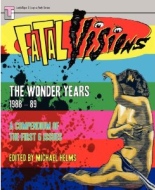 This very website serves as an extension for a DIY magazine I produced for a dozen years, beginning in 1993 around the height of zinedom. Titled Hitch: The Journal of Pop Culture Absurdity, the more-or-less quarterly specialized in reviews of films — the more outré, the better — which took up the better part of each issue’s back half.
This very website serves as an extension for a DIY magazine I produced for a dozen years, beginning in 1993 around the height of zinedom. Titled Hitch: The Journal of Pop Culture Absurdity, the more-or-less quarterly specialized in reviews of films — the more outré, the better — which took up the better part of each issue’s back half.
While I’m glad to be out of the zine scene (it’s a ton of work to put out anything of quality), I hold affection for those times, partly for the movies and subgenres to which I became exposed. I feel like I have found a counterpart of sorts in Australia’s Michael Helms, whose Fatal Visions zine celebrated “sleaze, violence and sexploitation in the cinema” for a decade.
Fatal Visions: The Wonder Years 1988-89 collects the first six issues in paperback, complete except for the excision of reader letters. Each issue among the dirty half-dozen is devoted almost exclusively to reviews of flicks then new to theaters, via VHS rentals or airing on Melbourne TV stations.
A majority of the films are United States productions, so the Down Under viewpoints of Helms and his review crew grant an added level of interest to their rough-and-tumble criticism. While you’ll find all-American blockbusters like Tim Burton’s Batman covered, titles lean heavily on sequels, horror, Troma, Jackie Chan, Roger Corman and assorted trash.
Longer pieces include a Q-and-A with gore king Herschell Gordon Lewis, memoirs of an X-rated paperback novelist, a brief look at Bruceploitation and, better yet, a three-part series that “reviews” the local porn palace theaters, then near-extinct. Only an extended essay on Aussie censors comes off as a little too “had to be there,” yet it’s always nice to see intelligent voices fighting the good fight against those who wish to legislate their own religious beliefs onto the populace.
Much of Fatal Visions‘ nostalgic charm stems from the wealth of clipped newspaper ads — a lost art dearly missed in this online-ticketing era of Fandango and Moviefone. Charming, too, is Helms’ writing style, built more on passion than polish. Readers should be warned that this book hasn’t cleaned up the original errors, which number many, coming from a cut-and-paste zine and all. Those who used to send stamps or a few bills in the mail in return for such homemade publications won’t care. —Rod Lott

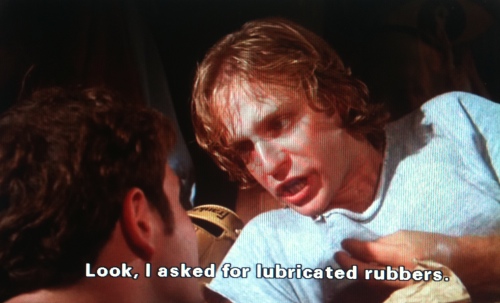
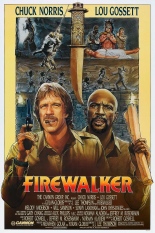
 Chuck Norris does his best Harrison Ford (which isn’t good enough) in
Chuck Norris does his best Harrison Ford (which isn’t good enough) in 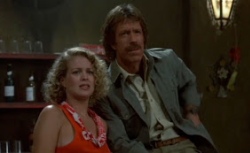 Finding the cave is simple; getting the gold is another matter. Chuck sums up the plot as best as anyone: “OK, you’ve got gold, human sacrifice, a dagger and the sun.” He and his cohorts get into all sorts of wacky, Central American pickles, from puttering around the jungle in a camo-painted VW Bug to hopping aboard a train disguised as Catholic clergy members.
Finding the cave is simple; getting the gold is another matter. Chuck sums up the plot as best as anyone: “OK, you’ve got gold, human sacrifice, a dagger and the sun.” He and his cohorts get into all sorts of wacky, Central American pickles, from puttering around the jungle in a camo-painted VW Bug to hopping aboard a train disguised as Catholic clergy members. 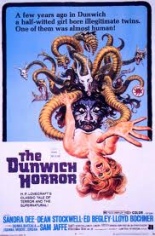
 In
In 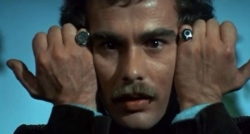
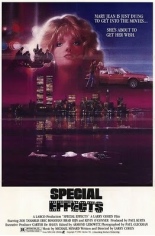
 Larry Cohen does his best Brian De Palma imitation with
Larry Cohen does his best Brian De Palma imitation with 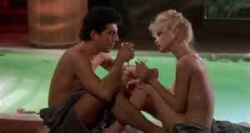 Rather than become the prime suspect, Neville cannily deflects suspicion by making a movie about the murder, with the intent to pin the crime on the yokel spouse who agrees to play himself. Essaying the role of Mary Jean is her dead ringer, Elaine (also Tamerlis), a clothes sorter at the Salvation Army.
Rather than become the prime suspect, Neville cannily deflects suspicion by making a movie about the murder, with the intent to pin the crime on the yokel spouse who agrees to play himself. Essaying the role of Mary Jean is her dead ringer, Elaine (also Tamerlis), a clothes sorter at the Salvation Army.